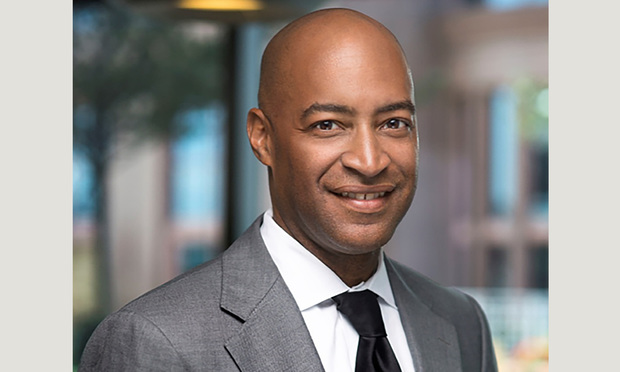 Damien Atkins, general counsel for The Hershey Co.
Damien Atkins, general counsel for The Hershey Co.
Before Damien Atkins was the general counsel of The Hershey Co., before he served as the top lawyer for Panasonic USA and before he was an in-house leader for AOL, he was an associate at a New York law firm where the primary billing partners were white men.
This was the late 1990s. And a general counsel named Vernon Baker of ArvinMeritor Inc. gave Atkins a "huge break," simply by making a point of saying, "I'd like to see some African Americans on my matters," Atkins remembers.
Recommended For You
"The next thing you know, there I am," he said.
Now, Atkins is in a position to be a catalyst for change. At Panasonic and now at Hershey, he has helped to develop and foster diverse talent at the law school level through an internship program with Archer & Greiner.
On Juneteenth, he and Jason Reiman, Hershey's chief supply chain officer, did something that had never been done before at Hershey. They co-led a virtual companywide town hall meeting that gave employees the opportunity to speak freely about racism.
Atkins, who recently wrote about "Refusing to Lose Hope," serves as chair-elect of the Minority Corporate Counsel Association and has two children, ages 9 and 11. He spoke with a writer from BenefitsPRO's sister site, Corporate Counsel, about that town hall meeting, George Floyd, Black Lives Matter and how to drive change as an in-house leader. The conversation has been edited for clarity and length.
Corporate Counsel: You recently helped lead a company-wide town hall on Juneteenth about race and racism. How did that conversation go?
Damien Atkins: As a participant, I thought it went really well. From my perspective, and I think from Jason Reiman's perspective, and the audience feedback, it was a resounding success. As part of leadership, you have to model the behavior that you want the rest of the organization to engage in and we have been asking people on the team to engage in courageous conversations. And if we don't see the leadership actually doing that and demonstrating that, you lose credibility.
Did you get the sense that most employees seemed comfortable talking about these issues during the town hall?
If you gauge by the number of questions submitted, my sense was that people were very happy to participate and ask questions. And these were pretty tough questions.
Which questions really stood out for you?
The toughest question was, "What do you tell your children five or 10 years from now? What do you want them to remember about it?" Another tough question, which I initially thought, and I'll be frank with you, that was kind of silly, was, "What's it like being a Black man today in the post-George Floyd environment?" It caused me to think. The smart answer is, "same as it was three weeks ago. But my sense is that things are somewhat different.
Please tell us more about your responses to those questions.
On what is it like being a Black male in the post-George Floyd environment, I'd caveat that I'm 50 years old and my experience is someone in the Gen X range who came of age in the recession in the early '90s and Rodney King was the incident that really kind of shaped my worldview on a lot of these matters. I would say that it is an unusual experience. I walk around in my neighborhood, and I see Black Lives Matter signs at my neighbors' houses. I live in Westchester, New York, which is not a predominantly African American neighborhood. And this is not something I would have ever possibly imagined.
If you're used to living in a world where you've had your story—and I don't know if you've ever read the book "Invisible Man" by Ralph Ellison—but you have your own personal experiences and stories but have grown accustomed to living a life where those experiences are not necessarily mainstream or widely known. But now, within a day, everything changed. We're definitely living in interesting times. I'm getting asked my opinion a lot more on a lot of different things.
Is that a good thing?
I'm being very honest with you. I think initially there's some fatigue. Fatigue sets in because this has been my life experience for a long time. Numbers of people asking you, "Hey, what do you think about what's going on?" Fatigue does set in. But that said, everyone's coming from a good place. And you have to recognize that if this is the one small act of courage or kindness that you can do to spark change, then it's my obligation to entertain that and engage in those conversations.
How did you answer the question about what you'd tell your children?
I would tell them to think about the time that we all went to the protest. When we sat on a knee for 8 minutes and 46 seconds and why we did that. Think about the time when you took a walk in a neighborhood and saw BLM signs and what happened and why. I'd also have them remember that this is the time that dad instituted the rule of one hour of a historical documentary on American history or famous African Americans in history. Just think about those things as formative experiences and turning points for them.
Is that one hour of documentary viewing a day or week?
[Laughs] Just a week. I don't want to overdo it.
You've been with Hershey for about two years. Does Hershey work with more diverse outside counsel now than before you were hired as GC?
I would say, yes. But it's not a metric that I track in terms of outside counsel that I hire. But I tend to hire people, for sensitive matters, those folks with whom I have relationships. A substantial majority of those people either are people of color or women billing partners.
Looking in-house, tell me about your legal team at Hershey. How big is the team, and how many of the team members are minorities? How many are women?
I don't have the precise numbers, but I would say that it is over 50% women and of my direct reports, three are Black women.
CC: How many members are on your legal team?
It's legal, public affairs and security, so I want to say mid-50s.
If there are any GCs out there who might be reluctant to push for more diversity within their legal departments or to breach that topic with the executive team, is there any advice that you can give them?
You'd be surprised about what people on the executive teams don't care about, like if you ask CEOs or [chief financial officers] if they really care about the number of minority-owned firms or partners that they work with. They don't. So just go ahead and do it. It takes small acts of courage to go do what you think is right. Look, you're not going to hire someone who is unqualified, who is incapable of doing the job. That's suicide. So if you know people who are qualified, have the experience and the track record of success and happen to be Black, or Latino or a woman partner, then go ahead and do it. You would be surprised how little people care and how little people say.
For a while now we've been hearing lawyers, both in-house and outside counsel, calling for equality and diversity in the law. But it doesn't seem that much has really changed. What's your take?
There have been changes, but it's been more of a glacial pace. I think there's kind of the fear factor. I'll just say this, a lot of GCs, particularly if they didn't come out of the law firm setting, they don't know how law firms work from an economic standpoint. If you're going to advance the cause you've got to actually figure out who gets billing credit. We need to learn this from partners. How can we help you when we give you a matter? Giving a matter to a particular firm might not actually help that partner out. They might only get half the credit for it. Understanding and having those open conversations with law firm partners to understand how to actually empower someone.
Another way, which is easy to do, is find out who is staffing the matters on your bill. This can be done without swapping out firms entirely. Who is actually working on your matters? There are so many other ways you can have that impact. Maybe give a small matter to a rising associate so they can help build a book of business. Or maybe say, 'I'd like to see this person or that person on the team.' Those are things you can do.
You've worked as a corporate lawyer and as an in-house counsel and in-house leader for small and major tech companies. Have you experienced racism during your career?
I can't say that I've experienced racism directed at me that has impacted my career. The most important conversations about you and your career are the ones when you're not in the room. So I can't necessarily say I have any knowledge about what was said when I'm not around. But from my personal perspective, no, it has not. That said, it always has an influence. It always has an undertone in interactions that you have with everyone and you're consciously aware of it. It's not necessarily racism, it's just being aware of difference and how you can be perceived in different contexts. I've been in situations where I've been, 'Hmmm, well that's interesting.' But I can't say that it actually hurt my career so to speak. I'd also say that a lot of that is mindset. I tend to be one who views things through an opportunity lens. Any challenge, you can always flip it and turn it into an opportunity. And, look, everyone wants to be different. Everyone wants to stand out. Everyone wants to be different. I'm a Black male in a profession where there's not many of us. That's an opportunity for me to shine.
It does seem that the tone and urgency changed significantly with George Floyd's killing. How would you describe this moment?
It is one of those crucible, fulcrum moments that come around every 20 or 30 years. The last moment that I sensed something like this was during Rodney King. What is different about this in terms of magnitude is there are no other real distractions. There's no baseball. No football. You can't really travel and go away on vacation. Everyone's in front of their big screen or small screen. When you add COVID-19 quarantine plus everyone being stuck at home in front of their screen, the magnitude of this is just so much larger.
© Touchpoint Markets, All Rights Reserved. Request academic re-use from www.copyright.com. All other uses, submit a request to [email protected]. For more inforrmation visit Asset & Logo Licensing.







